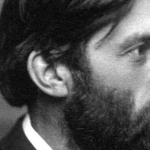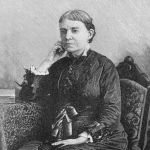Perfect little body, without fault or stain on thee,
With promise of strength and manhood full and fair!
Though cold and stark and bare,
The bloom and the charm of life doth awhile remain on thee.
Thy mother’s treasure wert thou;—alas! no longer
To visit her heart with wondrous joy; to be
Thy father’s pride;—ah, he
Must gather his faith together, and his strength make stronger.
To me, as I move thee now in the last duty,
Dost thou with a turn or gesture anon respond;
Startling my fancy fond
With a chance attitude of the head, a freak of beauty.
Thy hand clasps, as ’twas wont, my finger, and holds it:
But the grasp is the clasp of death, heartbreaking and stiff;
Yet feels to my hand as if
’Twas still thy will, thy pleasure and trust that enfolds it.
So I lay thee there, thy sunken eyelids closing,—
Go lie thou there in thy coffin, thy last little bed!—
Propping thy wise, sad head,
Thy firm, pale hands across thy chest disposing.
So quiet! doth the change content thee?—Death, whither hath he taken thee?
To a world, do I think, that rights the disaster of this?
The vision of which I miss,
Who weep for the body, and wish but to warm thee and awaken thee?
Ah! little at best can all our hopes avail us
Unwilling, alone we embark,
And the things we have seen and have known and have heard of, fail us.




















Comment form: